Many small business owners still rely on spreadsheets as their primary accounting tool. While this approach seems cost-effective, it’s fraught with risks.
Research shows that nearly 90% of spreadsheets contain errors, ranging from incorrect formulas and logic to copying mistakes and hard-coded values. These errors lead to significant financial mismanagement, affecting your business’s bottom line.
Switching to dedicated accounting software mitigates these risks and offers more advanced features that spreadsheets simply can’t provide.
Best Accounting Software for Small Businesses of 2024
- QuickBooks Online: Best for comprehensive financial management and accounting.
- Xero: Best for businesses needing strong multi-currency support and integrations.
- FreshBooks: Best for freelancers and small businesses seeking user-friendly invoicing and expense tracking.
- Zoho Books: Best for businesses already integrated into the Zoho ecosystem.
- Wave: Best for small businesses and freelancers seeking free, easy-to-use accounting software with robust features.
- Sage 50 Accounting: For small to medium-sized businesses with more complex accounting needs and inventory management requirements.
- QuickBooks Enterprise: Best for businesses that require advanced accounting features, higher capacity, and more complex financial management.
Verdict and Our Recommendation
For most small businesses, QuickBooks Online is the best choice. It’s versatile due to its comprehensive features and ease of use.
If you’re a freelancer or run a very small business, choose Wave. It offers an unbeatable price and essential accounting tools.
For businesses with more complex needs, such as those requiring advanced inventory management or industry-specific solutions, Sage 50 Accounting or QuickBooks Enterprise are the best fit.
Additionally, if you’re also looking for a budgeting tool for your business, our guide on the best budgeting software for small businesses may be a valuable resource.
1. QuickBooks Online
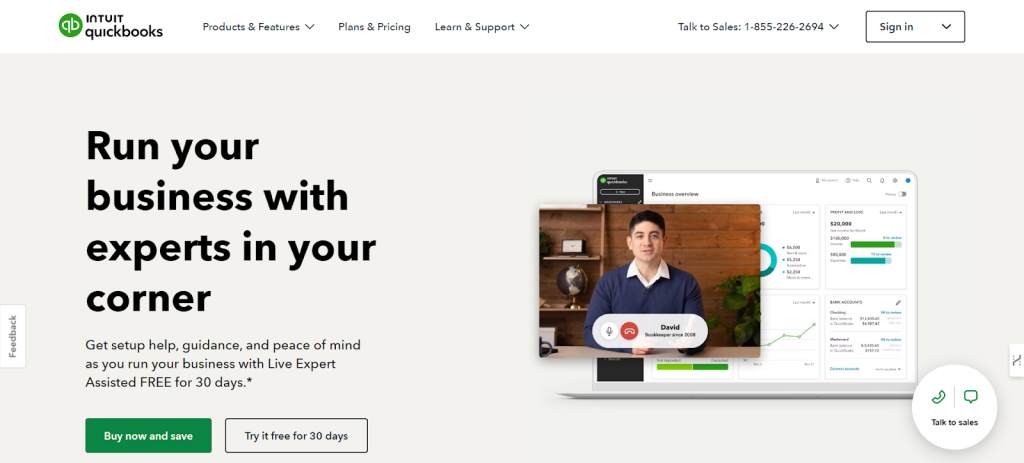
QuickBooks Online is a cloud-based accounting software developed by Intuit. It caters to small and medium-sized businesses.
One reason for its widespread adoption is its ability to accommodate the varying needs of different business sizes and industries. It fits all kinds of businesses, from a small retail shop to managing a consultancy to overseeing a growing e-commerce platform.
It covers everything from basic bookkeeping to more advanced financial management, including invoicing, expense tracking, payroll processing, and inventory management.
Why We Chose QuickBooks Online
Setting up QuickBooks Online was relatively straightforward, although I noticed a learning curve if you’re unfamiliar with accounting principles. The software has a user-friendly interface, but some nuances take time to understand when dealing with more advanced features like payroll and tax management.
However, once I got the hang of it, the intuitive design and the ability to customize the dashboard made daily financial tasks much easier.
One of the standout features for me was the integration capability. With over 750 apps available, including CRM tools and inventory management systems, QuickBooks Online seamlessly connected with the other tools I use daily.
I also found the automated accounting tasks valuable. From recurring invoices to expense tracking, QuickBooks Online automated many processes that consumed a significant portion of my day.
Another indispensable feature was the project profitability tracking. As someone who manages multiple projects simultaneously, seeing each project’s profitability at a glance helped me make more informed decisions. However, this feature starts with the Plus Plan, which is $99 monthly.
What We Didn’t Like About QuickBooks Online
Pricing is one area where I felt a bit of a pinch.
The monthly cost can add up quickly, especially if you need access to advanced features or add-ons like payroll management. You’ll need to top up with $50 for the cheapest payroll management plan.
Although QuickBooks offers a 50% discount for the first three months, the costs can still burden small businesses operating on tight budgets.
QuickBooks Online Features
- Invoicing and Payment Processing: QuickBooks Online supports automatic reminders for overdue payments, which helps maintain consistent cash flow. Additionally, you can accept payments directly through the invoice thanks to integrations with payment processors like PayPal, Stripe, and Square. This speeds up payment collection and simplifies the reconciliation process.
- Expense Tracking and Management: One of the most time-saving features of QuickBooks Online is its ability to track expenses automatically. You can connect your bank accounts and credit cards. The software then imports and categorizes transactions for you, reducing the need for manual entry. You can also attach receipts to transactions and track them for tax purposes, ensuring that all your expenses are accounted for at the end of the fiscal year.
- Payroll Management: QuickBooks Online offers an integrated payroll solution for businesses needing payroll management. It automates payroll calculations and tax deductions and handles direct deposits. One notable feature is the automatic tax filing, which ensures that your payroll taxes are filed accurately and on time, reducing the risk of penalties. However, this feature comes with an additional cost, starting at $50 per month.
- Project Profitability Tracking: QBO includes a project profitability tracking tool that is useful for businesses that manage multiple projects simultaneously. This feature allows you to assign income and expenses to specific projects, giving you a clear view of each project’s financial performance. The dashboard provides insights into labor costs, expenses, and overall profitability, helping you make informed decisions about resource allocation.
- Multi-Currency Support: QuickBooks Online provides multi-currency support if your business operates internationally. With automatic exchange rate updates, you can send invoices, accept payments, and track expenses in different currencies.
- Mobile App Access: QuickBooks Online’s mobile app is an extension of its desktop version, allowing you to manage your finances on the go. The app supports all core functions, including invoicing, expense tracking, and report generation.
QuickBooks Online Pricing
- Simple Start: $17.50/month (first 3 months at 50% off). This plan covers essential features like income and expense tracking, invoicing and payments, banking with a 5.00% APY, tax deductions, receipt capture, mileage tracking, one sales channel, cash flow management, general reporting, and contractor management.
- Essentials: $32.50/month (first 3 months at 50% off). Includes everything in Simple Start, plus enhanced reports, bill management, support for multiple currencies, access for up to three users, and time tracking for three sales channels.
- Plus: $49.50/month (first 3 months at 50% off). Adds comprehensive reporting, inventory management, project profitability tracking, financial planning, and supports up to five users across all sales channels.
- Advanced: $117.50/month (first 3 months at 50% off). Offers everything in Plus, with additional features like advanced reporting, automatic fixed asset tracking, custom access controls, workflow automation, Excel data sync, employee expense tracking, and 24/7 support for up to 25 users.
All QBO plans come with a 30-day free trial.
QuickBooks Online also offers payroll services as an add-on to any plan.
- The Payroll Core plan starts at $25 per month (after a 50% discount for the first three months), plus $6 per monthly employee.
- Payroll Premium is available for $42.50 per month for more comprehensive needs.
- The Payroll Elite plan costs $65 monthly for businesses requiring advanced HR support and tax penalty protection.
2. Xero
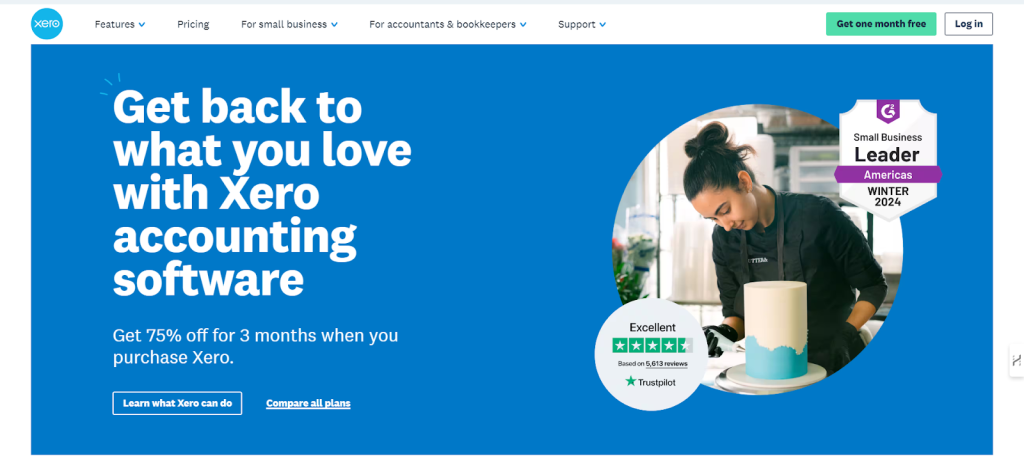
Xero provides tools for managing invoices, bank reconciliation, inventory, payroll, and financial reporting from a single interface.
It offers a real-time view of cash flow, supported by automated bank feeds that import transactions directly from your bank accounts. This lets you stay on top of your finances and make informed decisions with up-to-date financial data.
Why We Chose Xero
One of the main reasons I included Xero in this list is its real-time cash flow management.
The platform automatically imports and categorizes transactions from your bank accounts, providing an up-to-date view of your cash flow at any given time.
Like QuickBooks Online, Xero’s integration capabilities were another major factor in my decision.
With over 800 third-party apps available, Xero allows you to connect the software to your existing tools, such as CRM systems, e-commerce platforms, and payroll services.
Additionally, you get project tracking and inventory management features. These tools provide a detailed overview of each project’s financials and inventory levels.
Lastly, Xero allows multiple users with different access levels, making it easy to collaborate with your accountant and team members without compromising data security and ensuring better oversight of management accounts.
What We Didn’t Like About Xero
One of the main limitations was the restriction on the entry-level plan.
The Early plan only allows you to send 20 invoices and enter 5 bills per month. This limitation quickly becomes a bottleneck, even for small businesses or freelancers, forcing you to upgrade to a more expensive plan sooner than you might have anticipated.
Additionally, many advanced features, such as multi-currency support and project tracking, are only available in the highest-tier plan, priced at $78 per month.
Another disadvantage is Xero only allows you to manage one organization per account. If you operate multiple businesses or work as an accountant with multiple clients, you’ll need to purchase separate subscriptions for each entity, which can add to the overall cost.
Xero Features
- Multi-Currency Support: Xero’s multi-currency feature allows businesses to send invoices, accept payments, and track expenses in over 160 currencies. The software automatically updates exchange rates.
- Real-Time Bank Reconciliation: Xero automates bank reconciliations by importing and categorizing transactions directly from your accounts.
- Invoicing: Xero’s invoicing feature lets you quickly create and send professional-looking invoices. The platform supports automated reminders, recurring invoices, and online payment options.
- Inventory Management: Xero offers robust inventory management tools for businesses that manage physical products. The software tracks stock levels in real time, allowing you to monitor what’s in stock, what’s on order, and what’s selling the fastest.
- Project Tracking: Xero’s project tracking feature enables you to monitor the profitability of individual projects by tracking time, expenses, and invoices associated with each project.
- Comprehensive Reporting: Xero provides a range of customizable reports, including profit and loss statements, balance sheets, and cash flow reports.
- Integration with Third-Party Apps: Xero integrates with over 800 third-party apps, including popular CRM systems, e-commerce platforms, and payroll services.
Xero Pricing
As of September 2024, Xero offers a 75% discount for the first 3 months when you sign up for any of their plans.
- Established: Regularly $78/month, discounted to $19.50/month for the first three months. This plan offers all the features of the Growing plan, with the addition of multi-currency support, project tracking, and advanced reporting.
- Early: Regularly priced at $15/month, but available for $3.75/month for the first three months. You can send 20 invoices and quotes, enter up to 5 bills, reconcile bank transactions, integrate with Hubdoc, and support multiple currencies.
- Growing: Priced at $42/month, discounted to $10.50/month for the first three months. It includes everything in the Early plan, unlimited invoices and quotes, bills, and bank reconciliations.
3. FreshBooks
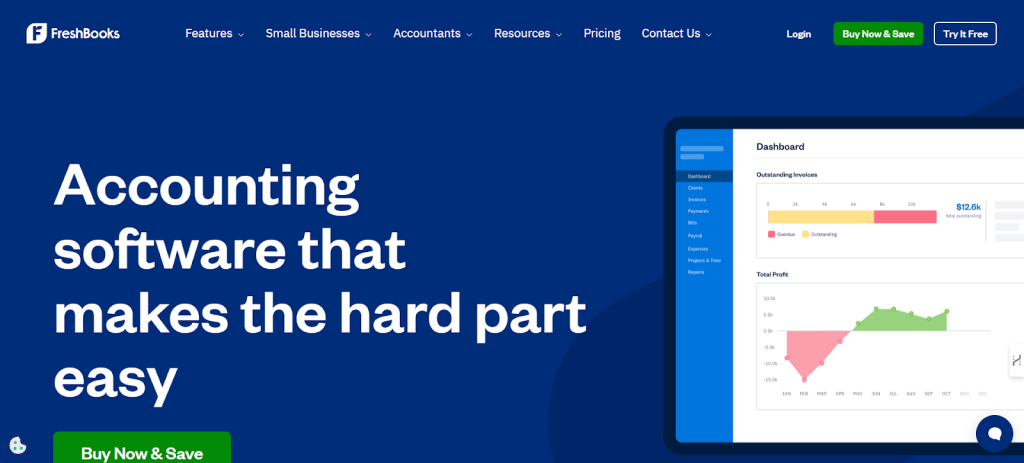
FreshBooks initially gained popularity as an invoicing tool, but it has since expanded its feature set to include expense tracking, time tracking, project management, and basic accounting functionalities.
It’s an ideal solution for service providers managing client relationships, billable hours, and project expenses within one platform.
Why We Chose FreshBooks
The invoicing features were a major selling point for me. FreshBooks allows you to create highly customizable, professional-looking invoices that can be sent directly to clients.
The platform also supports automated invoice reminders, which help you maintain a steady cash flow by ensuring clients are prompted to pay on time.
Additionally, FreshBooks offers multiple payment options, including credit card and bank transfer payments, which makes it easier for your clients to pay your invoices.
Another reason I chose FreshBooks was its time-tracking and project-management capabilities. For a service-based business, tracking billable hours accurately is crucial. FreshBooks integrates time tracking directly into its invoicing system, allowing you to convert tracked hours into invoices with just a few clicks.
Moreover, FreshBooks provides excellent expense-tracking tools. You can easily categorize expenses, attach receipts, and even bill clients for expenses directly through the software.
What We Don’t Like About FreshBooks
FreshBooks has less robust accounting features than more comprehensive tools like QuickBooks or Xero.
FreshBooks is primarily designed for small service-based businesses, so it will not be sufficient for businesses with more complex accounting needs.
Additionally, FreshBooks charges an extra fee for additional users, which adds up if you need to provide access to multiple team members. It charges an extra $11 per user per month to add users beyond the first one on all these paid plans.
FreshBooks Features
- Time Tracking and Billable Hours: Unlike many other accounting tools, FreshBooks includes unlimited time tracking in all its plans. This feature is useful for service-based businesses that bill clients by the hour. You can log hours directly in the app and then easily convert those hours into invoices.
- Client and Project Management: FreshBooks integrates client and project management into its accounting platform, making it easier to manage business operations. You can manage client information, track project progress, and monitor each project’s profitability.
- Integration with Over 100 Apps: FreshBooks integrates with many apps, including Gusto for payroll, HubSpot CRM, Squarespace, and Slack.
- Customizable Reports and Dashboards: FreshBooks offers customizable reports and dashboards. Basic reporting is available in all plans, but higher-tier plans unlock more advanced features, such as tracking project profitability and detailed financial health reports.
FreshBooks Pricing
- Lite: $19.00/month. Best suited for freelancers and small businesses with basic invoicing needs.
- Plus: $33.00/month. Ideal for growing businesses that require additional client management and advanced features.
- Premium: $60.00/month. It’s designed for established businesses that need unlimited client billing and advanced reporting capabilities.
- Select: Custom pricing. Tailored for large businesses with complex needs and a requirement for personalized support.
FreshBooks offers a 30-day free trial with no credit card required, so try it out to assess its suitability before committing long-term.
4. Zoho Books
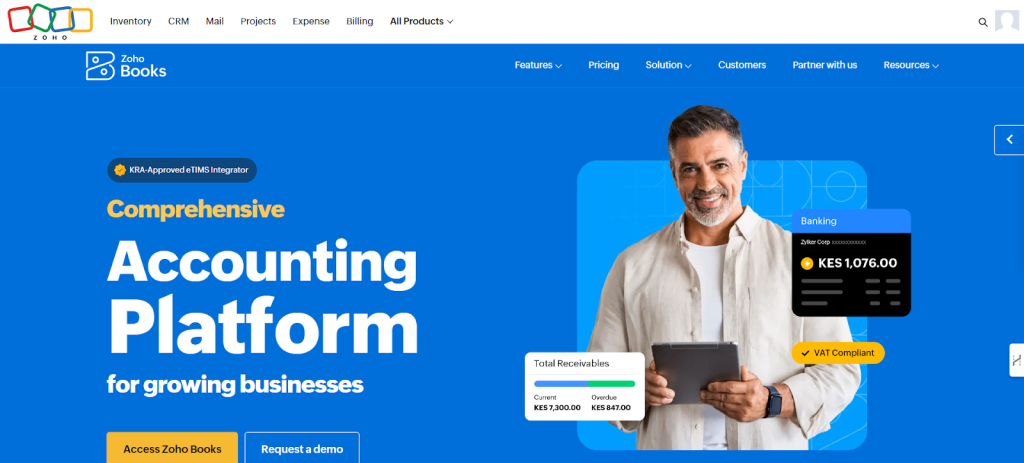
Zoho Books is part of the broader Zoho suite of business applications, which includes CRM, project management, and HR tools.
Zoho Books offers features like basic bookkeeping, advanced financial reporting, and automation.
The platform is well-regarded for its affordability, extensive integrations, and robust automation capabilities.
Why We Chose Zoho Books
One of the primary reasons I chose Zoho Books was its affordability and comprehensive features. Unlike many accounting software options in this list, Zoho Books offers impressive features at a fraction of the cost.
Zoho Books provides a free plan for businesses earning less than $50,000 annually. So, as your business grows, you can easily scale up to more advanced plans without facing steep price increases.
As your business grows, it’s easy to transition to more advanced plans that offer functionalities like multi-currency handling, inventory management, and project tracking without breaking the bank.
Another standout feature is Zoho Books’ integration with the broader Zoho ecosystem.
If you’re already using Zoho CRM to manage your customer relationships, the seamless integration with Zoho Books is a significant advantage.
It also offers extensive automation capabilities, similar to Zoho Books. The software allows you to automate routine tasks like sending recurring invoices, following up on overdue payments, and categorizing expenses.
What We Don’t Like About Zoho Books
The number of users is capped, even in the higher-tier plans. For example, the Ultimate plan allows only up to 15 users, which is restrictive for larger businesses.
Also, each plan limits the number of invoices you can generate annually. The Standard plan allows up to 5,000 invoices, while the Professional plan allows up to 10,000.
Some advanced features, such as billing, certain automation capabilities, and customer multi-currency transactions, are only available in higher-tier plans.
Zoho Books Features
- Customizable Automation Rules: While many accounting platforms offer basic automation for recurring invoices or expense tracking, Zoho Books allows you to create highly customizable automation rules. For instance, you can set up rules to automatically send a thank-you email after a payment is received or to flag and notify you of transactions above a certain threshold.
- Client Portal with Real-Time Collaboration: Zoho Books includes an integrated portal that facilitates real-time client collaboration. This portal lets clients view invoices, approve estimates, make payments, and even leave feedback on documents.
- Web Tabs and Custom Modules: Zoho Books allows you to add Web Tabs within the software interface. These tabs can link to any external URL or web-based application, embedding additional tools directly into your accounting dashboard.
- Multi-Transaction Number Series: This allows you to assign different numbering sequences to various transactions, such as invoices, credit notes, and purchase orders.
- WhatsApp Integration for Notifications: Zoho Books has introduced integration with WhatsApp, allowing businesses to send sales transactions, payment reminders, and other notifications directly to customers through the messaging platform.
Zoho Books Pricing
- Free: $0/month. Includes basic invoicing, expense tracking, customer portal, and reporting. Ideal for businesses with annual revenue under $50,000.
- Standard: $15/month (billed annually). Adds sales tax tracking, recurring expenses, custom reports, and divisional reporting to the Free plan features.
- Professional: $40/month (billed annually). Includes everything in Standard, plus vendor bills management, multi-currency transactions, project profitability, and inventory tracking.
- Premium: $60/month (billed annually). Offers all Professional features, with added advanced customization, budget management, and cash flow forecasting.
Zoho Books also offers a 14-day free trial. They say, “If you find the two weeks insufficient to evaluate our product, you can extend the trial period by an additional 14 days.”
5. Wave
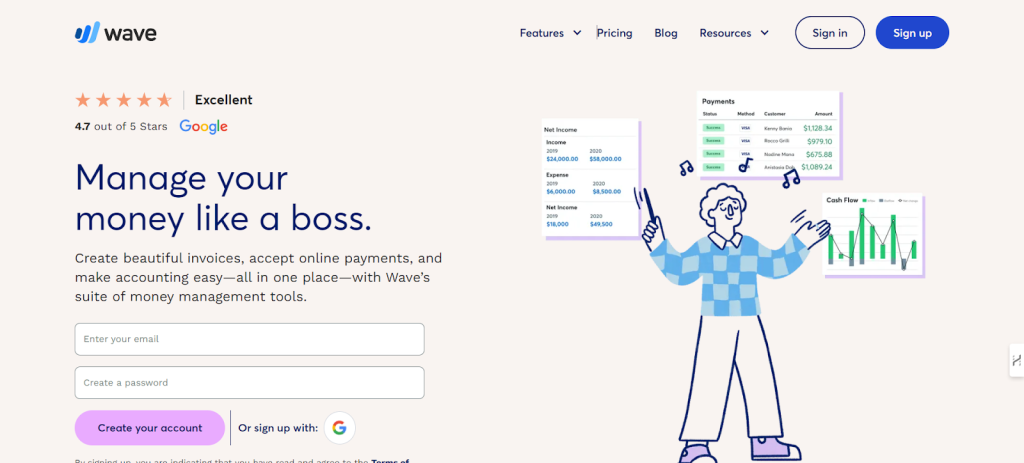
Wave is a free, cloud-based accounting software for small businesses, freelancers, and solopreneurs.
It offers comprehensive features despite being free, making it an excellent option for managing small business finances without breaking the bank.
Why We Chose Wave
The first reason is cost. Wave’s core accounting features, which include invoicing, accounting, and receipt scanning, are completely free. This makes it appealing for small businesses and freelancers operating on a tight budget.
Wave offers easy-to-use tools for managing your business finances. Setting up your accounts is straightforward, and the user interface is intuitive, allowing even those with little accounting experience to get up and running quickly.
Another reason I like Wave is its simplicity in invoicing and payment processing features.
You can create and send professional invoices, accept credit card payments, and automatically track the status of your invoices. Payments are directly integrated into the accounting software, making keeping your financial records current easy.
What We Don’t Like About Wave
Wave lacks more advanced features like project management, time tracking, and inventory management, available in some paid accounting tools.
Additionally, Wave’s payroll services are only available in the United States and Canada, which is a disadvantage if your business operates in other regions.
It prioritizes its local markets and allocates resources to support its growing functionality in these regions.
Finally, while Wave’s customer support is available, it is limited compared to paid options. Support is provided via email, and live chat is only available to payroll customers, which might be a limitation if you need immediate assistance.
Wave Features
- Invoicing and Payment Processing: Create and send professional invoices, accept credit card payments, and seamlessly track your income and expenses.
- Expense Tracking: Automatically import transactions from your bank account, categorize them, and track your expenses for better financial management.
- Receipt Scanning: The Wave mobile app allows you to scan receipts on the go, ensuring all expenses are recorded and categorized correctly.
- Payroll Management: Available in the US and Canada, Wave’s payroll services help manage employee payroll, tax filings, and year-end reporting.
- Accounting Reports: Wave offers a range of accounting reports, including profit and loss statements, balance sheets, and tax summaries, providing a clear picture of your financial health.
- Multi-Currency Support: Wave supports transactions in multiple currencies, with automatic exchange rate updates, for businesses with international clients.
Wave Pricing
- Starter: $0/month. This includes unlimited estimates, invoices, bills, and bookkeeping records, with an option to accept online payments (standard fees apply). It also allows invoicing on the go via the Wave app and managing cash flow and customers from one dashboard.
- Pro: $16/month. Everything in the Starter plan, plus discounted rates for online payments, automatic bank transaction imports and categorization, and the ability to digitally capture and track unlimited receipts and expenses.
Wave’s Pro Plan subscription fee is charged per business rather than per individual user. You can manage multiple business profiles with the same subscription and a single Wave account.
6. Sage 50 Accounting
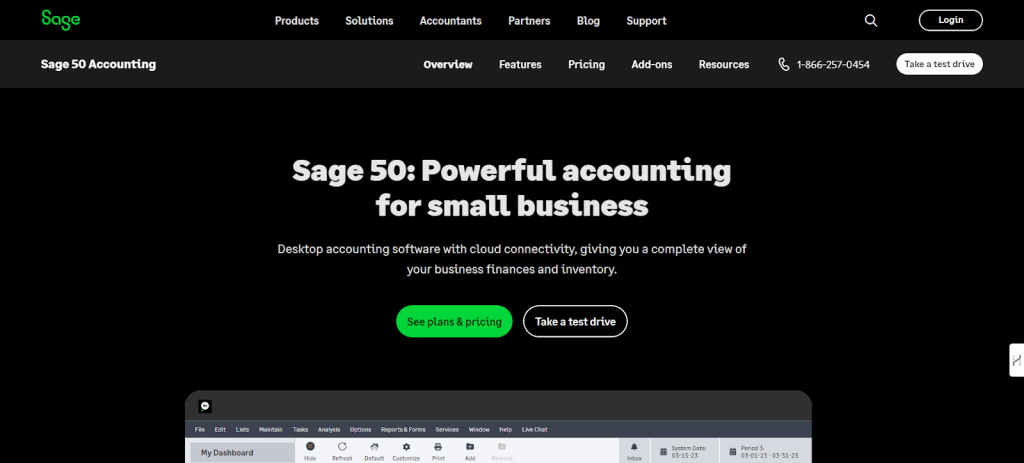
Sage 50 Accounting shines for small to medium-sized enterprises that require advanced features without sacrificing ease of use.
It’s part of the broader Sage product family but is distinct in its feature set and target audience.
Sage 50 Accounting is known for its depth in areas like inventory management, project costing, and reporting, making it a suitable choice for businesses with more complex accounting needs.
Why We Chose Sage 50 Accounting
Sage 50 Accounting excels in inventory management, providing detailed tracking and control over stock levels, pricing, and sales.
This feature works best for businesses with large inventories or those needing to track multiple warehouses. The software supports complex inventory needs, including serialized inventory tracking and automated stock reorder alerts.
For businesses that handle payroll internally, Sage 50 Accounting offers integrated payroll services that support advanced features like retirement plan management and federal tax compliance.
What We Don’t Like with Sage 50 Accounting
Sage 50 Accounting has a steep learning curve. The interface, while powerful, is overwhelming due to its complexity and the abundance of features available.
It’s also more expensive than other small business accounting software options. Its advanced features come at a premium, starting at $60 monthly for only one user.
The cost of additional modules, such as payroll and inventory management, can also add up, making it a significant investment for small businesses. For example, the Pro Accounting with Payroll plan for 1 to 10 employees costs $1,025 annually.
Sage 50 Accounting Features
- Granular Inventory Management: Sage 50 Accounting allows you to manage stock levels precisely, including tracking by serial numbers, managing multiple pricing levels, and setting up automatic reordering alerts.
- Advanced Project Costing: You can allocate costs and revenues to specific jobs or projects, providing detailed profitability analysis.
- Sage Security Shield: Sage 50 includes a robust security feature known as Sage Security Shield, which provides dark web monitoring, business credit monitoring, and access to a fraud hotline.
- Microsoft 365 Integration: This integration enhances productivity, as you can manage your accounting data directly within Microsoft 365 applications.
- Customizable Dashboards: Sage 50 Accounting provides highly customizable dashboards, allowing you to tailor your interface to display the most relevant data and analytics at a glance.
Sage 50 Accounting Pricing
- Pro Accounting: $607/year. Designed for solopreneurs and small businesses, this plan supports 1 user and includes basic invoicing, billing, job costing, inventory management, and automated bank reconciliation.
- Premium Accounting: $1,043/year. An advanced option for small businesses, supporting 1 user. It includes all Pro features, plus advanced budgeting, audit trails, change order management, and industry-specific features.
- Quantum Accounting: $1,780/year. The most comprehensive plan, offering the full Sage 50 experience. It supports 1 user and includes everything in Premium, with added features like support for up to 40 users, role-based security, and advanced workflow management.
Currently, Sage 50 does not offer a traditional free trial. However, you can explore the software by taking a test drive or watching an on-demand demo to get a feel for its features and capabilities.
7. QuickBooks Enterprise
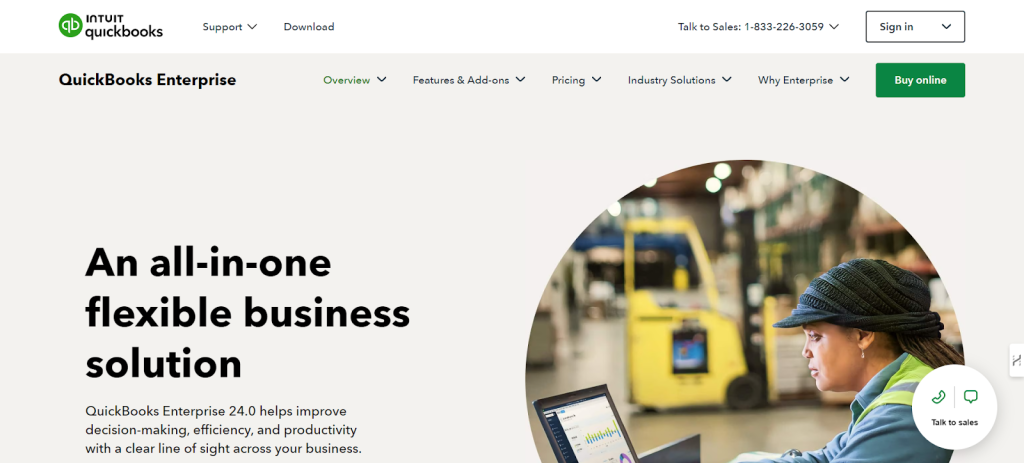
QuickBooks Enterprise is powerful accounting and business management software for small and mid-sized companies that have outgrown simpler accounting tools.
Unlike QuickBooks Online, it’s well-suited for businesses that need advanced inventory management, job costing, and comprehensive financial reporting.
Why We Like QuickBooks Enterprise
QuickBooks Enterprise supports up to 40 users and can handle large datasets, making it suitable for companies anticipating expansion.
This scalability is a significant advantage over other accounting software that might struggle with larger volumes of data or more complex operations.
QuickBooks Enterprise’s inventory management capabilities are outstanding. Its features, such as multi-location tracking, barcode scanning, and automatic reordering, provide businesses with the tools to manage complex inventory systems efficiently.
The software includes over 200 customizable reports, allowing businesses to generate detailed financial, sales, and inventory reports.
What We Don’t Like About QuickBooks Enterprise
QuickBooks Enterprise is one of the more expensive accounting solutions on the market.
The annual subscription for the Gold plan starts at $1,922 and goes up to $4,668 for the Diamond plan.
This high cost can be prohibitive for smaller businesses or those with limited budgets.
While it offers powerful tools, the interface is less intuitive than cloud-based alternatives like QuickBooks Online or Xero. This leads to a longer onboarding process and may require additional staff training.
Unlike many modern accounting tools, QuickBooks Enterprise is primarily a desktop-based application. Although cloud hosting is available, it comes at an additional cost.
Also, adding more users to QuickBooks Enterprise increases the overall cost. Each additional user requires a separate license, which adds up quickly for businesses needing scale.
QuickBooks Enterprise Features
- Scalability: QuickBooks Enterprise supports up to 40 users and can handle large datasets, making it suitable for companies anticipating expansion.
- Priority Customer Support: QuickBooks Enterprise provides 24/7 priority support through its Priority Circle program, which includes access to a dedicated account manager and on-demand training.
- Industry-Specific Solutions: QuickBooks Enterprise offers industry-specific editions tailored to the unique needs of sectors like construction, manufacturing, and nonprofit organizations.
QuickBooks Enterprise Pricing
- Gold: $1,922/year. Offers basic functionality, business insights, payroll integration, support for 1-10 or up to 30 users, cloud access (with additional fees), online backup data storage, Advanced Reporting, and QuickBooks Priority Circle service.
- Platinum: $2,363/year. Includes everything in Gold, plus multi-company management, advanced inventory, advanced pricing, and bill and purchase order workflow approvals.
- Diamond: $4,668/year. Offers all the features of Platinum, plus QuickBooks Time Elite (at $5 per employee per month) and Salesforce CRM Connector (at $150/month per company file), with support for up to 40 users.
Prices are for annual subscriptions and custom pricing is available. Additional fees may apply for cloud access and other features.
Invest in an Accounting Software
Financial literacy remains a significant challenge for many small business owners. According to a survey commissioned by Intuit QuickBooks, nearly half (42%) of small business owners admitted they had limited or no financial literacy before starting their businesses.
This lack of knowledge can lead to costly mistakes, with low financial literacy potentially costing small business owners an average of $118,121 in lost profit.
Accounting software helps bridge this gap by offering intuitive interfaces, automated processes, and real-time data. It empowers users to make informed decisions and avoid financial pitfalls.
Investing in the right financial tools helps secure your business’s future stability and growth and avoid losses.
Make an informed choice today and set your business up for long-term success.
Frequently Asked Questions
What is the most commonly used accounting software?
QuickBooks Online is the most commonly used accounting software among small businesses for managing financial transactions.
Is QuickBooks good for small businesses?
Yes, QuickBooks is highly regarded for small businesses due to its comprehensive features, ease of use, and ability to handle various accounting tasks.
What is the simplest and easiest accounting software?
Wave Accounting is the simplest and easiest accounting software for small businesses and freelancers. It has a user-friendly interface and offers essential accounting features without overwhelming users.
Do I need accounting software for small business?
Yes, accounting software is essential for small businesses to manage finances efficiently, automate tasks, and maintain accurate records for tax and reporting purposes.
How much does accounting software cost?
Basic accounting software starts at around $10 to $50 monthly for small businesses, while more advanced systems like QuickBooks Enterprise range from $1,000 to $5,000 or more annually. Additionally, costs may increase with added users, advanced features, or cloud access.
What type of accounting is best for small businesses?
Cash-basis accounting is often best for small businesses because it’s straightforward. This method tracks income when it’s received and expenses when it’s paid, helping manage cash flow more easily.
Is QuickBooks for small businesses worth it?
Yes, QuickBooks is worth it for small businesses. It provides a comprehensive set of accounting tools essential for managing finances, including invoicing, expense tracking, and reporting, all in one platform.
What is the easiest accounting program to use?
Wave Accounting or FreshBooks are the easiest to use. Both have user-friendly interfaces and straightforward setup processes, making them ideal for small businesses and freelancers with limited accounting experience.
Is there any free accounting software?
Yes, free accounting software options, such as Wave and Zoho Books, offer basic accounting features at no cost.
Can I do bookkeeping without QuickBooks?
Yes, you can do bookkeeping without QuickBooks. Other options include Xero, Zoho Books, and Wave, which offer similar functionality.
Can I use Excel instead of QuickBooks?
Excel can be used for basic bookkeeping, but it is not recommended for complex accounting tasks due to the risk of human error and lack of automation. Specialized accounting software like QuickBooks is generally more efficient and accurate.